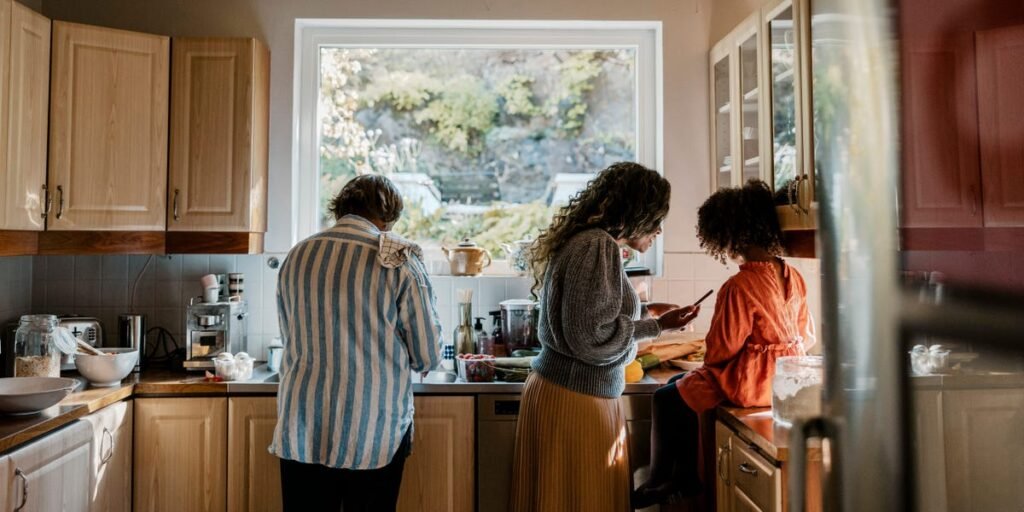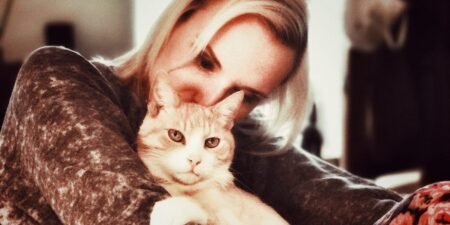This spring, I moved back in with my parents. Again.
The first time was early in the pandemic, when my daughter was a newborn and the world felt like a terrifying science experiment. We had been living in Brooklyn, and when the hospital barred partners from delivery rooms, we started calling doctors, midwives, anyone who might deliver our baby in the rural town in New Jersey where my parents live. Nobody was interested: it was a pandemic.
Finally, my mom begged her own doctor, who said yes. True New Yorkers, we didn’t have a car. My dad picked us up in his little red one, which we packed the car with diapers, onesies, and our desperate hopes. We thought we’d stay for two weeks. We stayed for five months.
That time was a blur of fear, early parenthood fog, and endless coffee, made every morning by my dad, who claims this is the secret to my parents’ 40-year marriage.
We walked the baby in loops around the neighborhood, discovering a covered bridge across the river and a nature path that looped around the local playground. We watched old movies. I yelled at my dad for finishing a jigsaw puzzle we were supposed to do together. It was chaos. It was unexpectedly sweet. It was our version of making it work.
I’m back under their roof again — now, with two kids
Now I’m back, but this time I have two kids, ages 3 and 5. My husband recently started a new job in Chicago, and while we search for a home and finish the school year, the kids and I are here in New Jersey with my mom and dad.
I braced myself for stress. For tight quarters, intergenerational friction, the awkwardness of not really having my own kitchen. (Why are there three opened jars of Dijon mustard in the fridge? Who knows? Not me.) I was preparing for the grind of solo parenting without the solo space.
But what I got instead surprised me: a crash course in co-parenting. A soft, sometimes messy, always helpful reminder that parenting doesn’t have to be a two-person — or one-person — job.
I realized I don’t have to do it alone while I’m living with them
My mom makes lunches and snacks and champions the “car bagel” every school morning. She helps with laundry and is always ready to distract a cranky kid with a game of Chutes & Ladders, a hunk of cheddar, or both.
My dad reads bedtime stories in his big, cozy voice. He’s taken over bike lessons — my daughter is almost ready to try to ride training-wheel free — and has become fluent in the nuanced language of playground drama. (“No, Zadie, Sammy is the one with the orange shorts. The other one is mean.”)
There’s something both vulnerable and liberating about relinquishing control. About letting other grown-ups take the reins without needing everything to be done my way. It’s not just logistical help (though, wow, it’s amazing to take a shower without three interruptions). It’s emotional support. It’s feeling like I’m not parenting in a vacuum.
Living together is teaching me what a ‘village’ can look like
My parents aren’t perfect. Neither am I. But somehow, in this full house of Goldfish crumbs and “Moana” many times over, we’ve landed on a rhythm that works. It turns out, “the village” doesn’t have to be a mythical concept or a Pinterest fantasy. Sometimes it’s just your parents down the hall, quietly loading the dishwasher while you collapse onto the couch.
I’ve learned that letting people help is an act of trust. That asking for support isn’t weakness — it’s resilience. That family can look like a lot of things: one big house, three generations, and a nightly debate about who tucks in and who checks in with a kiss five minutes later (not four, not six).
In a few weeks, we’ll move into our new life in Chicago. I’ll miss the unexpected closeness of this time. The way my kids light up when they (plus their stuffy sidekicks) see their grandparents first thing in the morning. The way my dad makes me coffee, even when I forget to ask.
This season has been exhausting and beautiful and loud. It’s reminded me that parenting, at its best, is never a solo act. It’s a chorus — sometimes off-key, often out of sync, but somehow perfectly imperfect.
Read the full article here

















